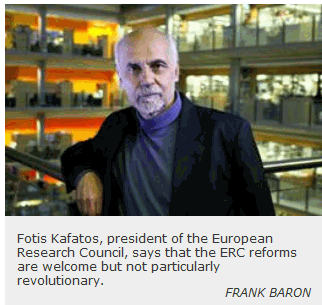|
|
|
|
|
|
|
News & Views item - October 2009 |
![]() European Commission Agrees to Some Suggested Administrative Changes for the
European Research Council. (October 23, 2009)
European Commission Agrees to Some Suggested Administrative Changes for the
European Research Council. (October 23, 2009)
Earlier this month we reported --
On February 24, 2009 the European Commission
announced the formation of a committee of leading experts in science policy,
from both Europe and overseas, to start reviewing the work of the
European
Research Council (ERC).
to start reviewing the work of the
European
Research Council (ERC).
The
53-page report![]() was published on
July 23, 2009. It made nine recommendations
for immediate implementation and in addition the report set out two long-range
assessments.
was published on
July 23, 2009. It made nine recommendations
for immediate implementation and in addition the report set out two long-range
assessments.
Now
The headhunting is to begin immediately with the hope that an appointment will be able to be made early in 2010.
Ms Gilbert also notes that: "the ERC's management arrangements were a source of
'great frustration and low-level conflict'. These included rules that meant
funding was awarded as contracts rather than grants, requiring researchers to
document in detail any time spent working on ERC-funded projects. An
investigation by Nature also revealed that
Commission bureaucracy was causing peer reviewers to refuse to work for the ERC,
threatening the body's future (see
Red tape strangles basic research grants)."
The European Commissioner for Science and Research, Janez Potočnik, said in a statement: "Two and a half years after its start, the ERC is regarded widely as a success and an influential component of the European Research Area. We are now announcing steps to help the ERC shift from its pioneering to its mature phase. Our actions and those under the responsibility of the scientific council will further improve the ERC's performance and guarantee its long term stability."
However, the Commission's response to the report does not address the recommendation that a further review of the council should take place within two years to determine if the Commission's reforms were effective. Otherwise the report recommended that the ERC should gain full administrative independence from the Commission.
Fotis Kafatos, president of the ERC, told Nature that the further review of progress "should be maintained. It's important to have successive reviews of the ERC. It is a crucial matter that the ERC is recognized as an upstanding and strong institution", and he said that as a whole the Commission's response is not "particularly revolutionary or extensive".
Finally, Ms Gilbert makes the point that: "The Commission also plans to put forward proposals to reform the rules governing the use and management of European Union funds so that ERC funding can be awarded as lump sums rather than as contracts, [but] any reforms, which are expected to be finalized by mid-2010, must be agreed on by the European Council, which is made up of the heads of state and the European Parliament."